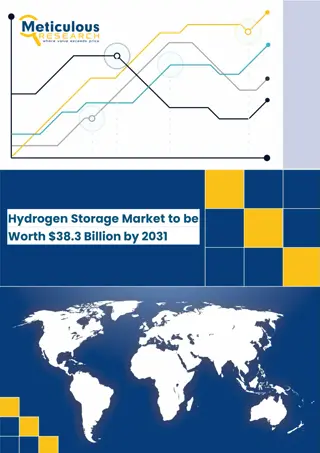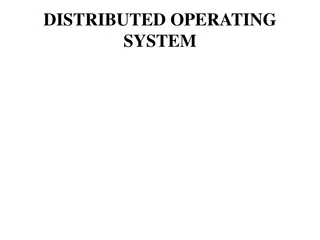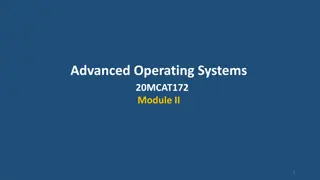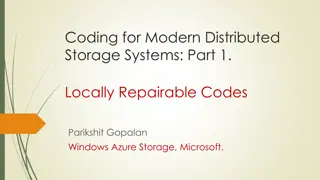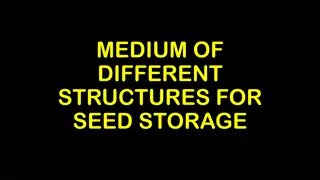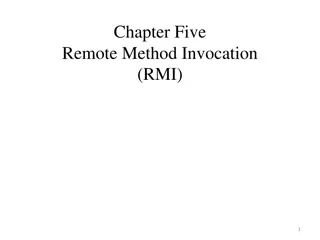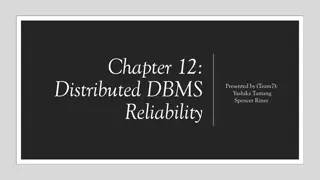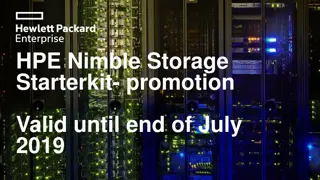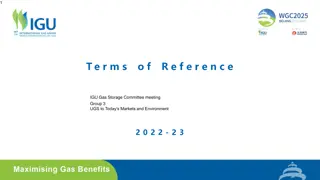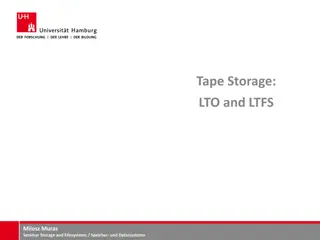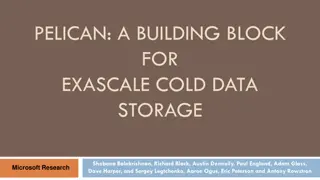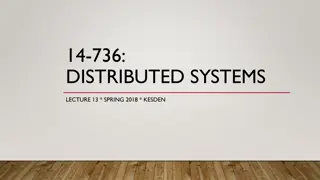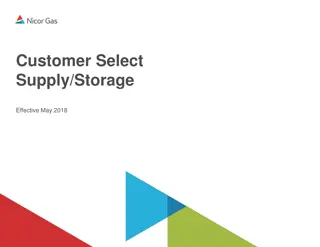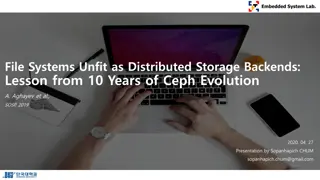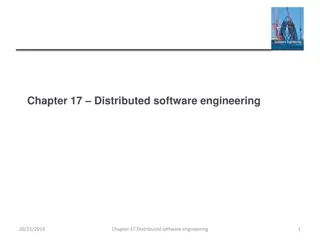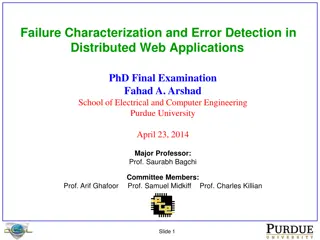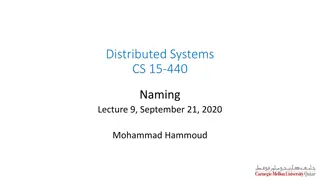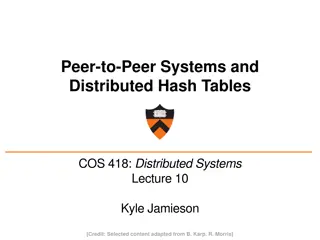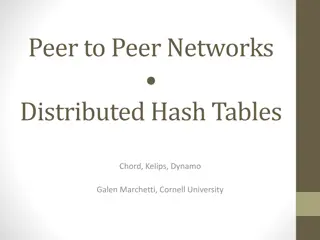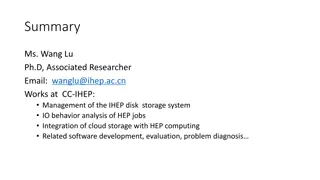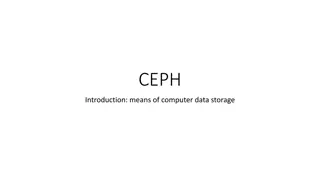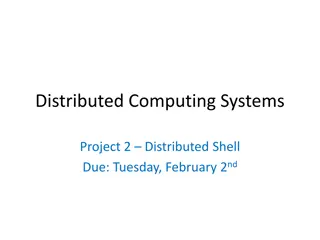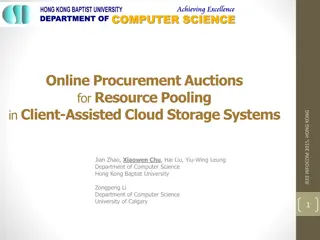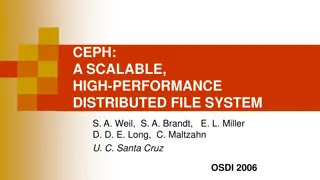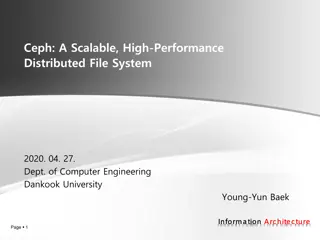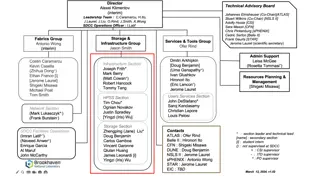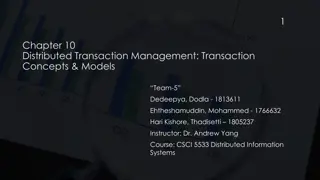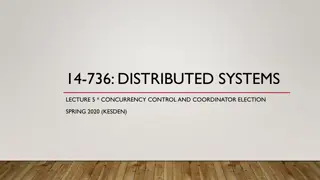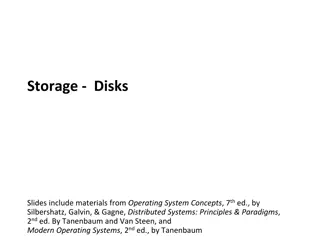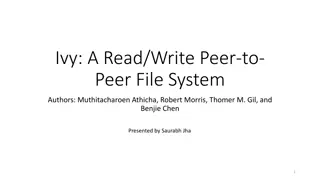Overview of Distributed Systems: Characteristics, Classification, Computation, Communication, and Fault Models
Characterizing Distributed Systems: Multiple autonomous computers with CPUs, memory, storage, and I/O paths, interconnected geographically, shared state, global invariants. Classifying Distributed Systems: Based on synchrony, communication medium, fault models like crash and Byzantine failures. Comp
9 views • 126 slides
Hydrogen storage market
Hydrogen Storage Market Size, Share, Forecast, & Trends Analysis by Storage Solution (Tanks, Cylinders), Storage Type (Physical Storage, Material-based Storage), Application (Fuel Cell, Chemical Production, Manufacturing, Oil & Gas), and Geography - Global Forecast to 2031\n
1 views • 4 slides
Overview of Distributed Operating Systems
Distributed Operating Systems (DOS) manage computer resources and provide users with convenient interfaces. Unlike centralized systems, DOS runs on multiple independent CPUs and prioritizes software over hardware. It ensures transparency and fault tolerance, with a focus on software error handling.
1 views • 36 slides
Energy Storage Systems: Regional Insights and Strategies
Energy Storage Systems Market by Technology (Pumped Hydro Storage, Electro-Chemical Storage, Electro-Mechanical Storage, and Thermal Storage), By Application (Transportation and Grid Management), By End User (Residential, Non-Residential, and Utiliti
4 views • 4 slides
Understanding CS 394B: Blockchain Systems and Distributed Consensus
This course, led by Assistant Professor Marco Canini, delves into the technical aspects of blockchain technologies, distributed consensus, and secure software engineering. Students will engage in flipped classroom-style classes and paper presentations, critiquing research papers, defending research
0 views • 65 slides
Understanding Distributed Mutual Exclusion in Operating Systems
In distributed systems, the problem of mutual exclusion arises when multiple sites/processes need to access shared resources concurrently. Unlike in single-computer systems, distributed systems lack shared memory, leading to the need for communication-based approaches rather than shared variables li
0 views • 49 slides
Data Storage Strategies for Modern Distributed Systems
This content discusses the challenges of storing vast amounts of digital data in distributed systems, exploring strategies like duplication, Reed-Solomon codes, and degraded reads for fault tolerance and quick recovery in the face of disk failures. It highlights the importance of efficient data stor
0 views • 23 slides
Understanding Parallel and Distributed Computing Systems
In parallel computing, processing elements collaborate to solve problems, while distributed systems appear as a single coherent system to users, made up of independent computers. Contemporary computing systems like mobile devices, IoT devices, and high-end gaming computers incorporate parallel and d
1 views • 11 slides
Various Structures for Seed Storage and Improved Rural Storage Methods
Different structures like Bitumen/Coal Tar Drum, Hapur Bin/Kothis, Udaipur Bin, Stone Bin, and Bamboo Bin are highlighted for seed storage. Improved rural-level storage structures including metal bins and clay bins are also discussed, offering cost-effective and efficient options for preserving food
2 views • 21 slides
Understanding Remote Method Invocation (RMI) in Distributed Systems
A distributed system involves software components on different computers communicating through message passing to achieve common goals. Organized with middleware like RMI, it allows for interactions across heterogeneous networks. RMI facilitates building distributed Java systems by enabling method i
1 views • 47 slides
Distributed DBMS Reliability Concepts and Measures
Distributed DBMS reliability is crucial for ensuring continuous user request processing despite system failures. This chapter delves into fundamental definitions, fault classifications, and types of faults like hard and soft failures in distributed systems. Understanding reliability concepts helps i
0 views • 58 slides
HPE Nimble Storage Solutions: Starter Kits Promotion
Explore HPE Nimble's all-flash and adaptive flash storage starter kits, including the AF20, AF40, and HF20 models with varying capacities and performance levels. Take advantage of the special promotion valid until the end of July 2019 to enhance your storage infrastructure. These kits offer high-qua
0 views • 9 slides
IGU Gas Storage Committee 2022-23 Meeting Highlights
The IGU Gas Storage Committee, Group 3, discussed key topics for 2022-23 including underground storage, evolving market conditions, decarbonized energy storage, and the role of underground hydrogen storage. The committee aims to advocate positions, cooperate with stakeholders, and enhance IGU's visi
0 views • 10 slides
Understanding Tape Storage: LTO and LTFS Overview
Delve into the world of Tape Storage with a comprehensive overview of LTO (Linear Tape-Open) and LTFS (Linear Tape File System). Explore the history, generations, features, and physical properties of tape storage technologies. Gain insights into hierarchical storage management, cost considerations,
0 views • 19 slides
Distributed Algorithms for Leader Election in Anonymous Systems
Distributed algorithms play a crucial role in leader election within anonymous systems where nodes lack unique identifiers. The content discusses the challenges and impossibility results of deterministic leader election in such systems. It explains synchronous and asynchronous distributed algorithms
2 views • 11 slides
PELICAN: A Building Block for Exascale Cold Data Storage
PELICAN addresses the need for cost-effective storage of cold data in the cloud, offering exabyte-scale storage solutions. By provision resources specifically for cold data workloads, it optimizes storage efficiency and reduces unnecessary resources, resulting in high-density, low-cost storage with
0 views • 30 slides
Overview of EGI Online Storage Service Architecture and Interfaces
EGI Online Storage service provided by EOSC-hub under Horizon 2020 program offers File Storage, Block Storage, and Object Storage options. Users can access highly scalable storage with different interfaces. The service allows data access through standard protocols, fault tolerance replication, globa
0 views • 18 slides
Gas Storage Investment Workshop Insights
Explore key insights from the Gas Storage Europe workshop on regional storage investments, the role of gas storage in ensuring security of supply, and its impact as a commercial tool. The workshop covered market challenges, energy sustainability, and the future of underground gas storage, highlighti
0 views • 10 slides
Overview of Distributed Systems, RAID, Lustre, MogileFS, and HDFS
Distributed systems encompass a range of technologies aimed at improving storage efficiency and reliability. This includes RAID (Redundant Array of Inexpensive Disks) strategies such as RAID levels, Lustre Linux Cluster for high-performance clusters, MogileFS for fast content delivery, and HDFS (Had
0 views • 23 slides
Nicor Gas Supply and Storage Overview
Nicor Gas provides gas supply and storage services effective May 2018 in a service territory covering over 17,000 square miles and serving 640 communities with 2.2 million customers. The gas supply and storage network includes major cities like Rockford, Chicago, and Naperville, serviced by undergro
0 views • 23 slides
Evolution of Ceph's Storage Backends: Lessons Learned
Embedded System Lab explores the challenges of building storage backends on local file systems, focusing on the evolution of Ceph's storage backend over a decade. The presentation delves into the complexities of distributed storage systems like Ceph, highlighting difficulties in leveraging efficient
0 views • 27 slides
Wholesale Storage Load Metering of Losses in Distributed Generation Battery Facility
Example system configuration in ERCOT involving a wholesale storage load metering system to track losses in a distributed interconnected generation battery facility. The system includes electrical storage systems, generation resources, and distribution generation components. Challenges arise in dete
0 views • 8 slides
Distributed Software Engineering Overview
Distributed software engineering plays a crucial role in modern enterprise computing systems where large computer-based systems are distributed over multiple computers for improved performance, fault tolerance, and scalability. This involves resource sharing, openness, concurrency, and fault toleran
0 views • 66 slides
Challenges in Detecting and Characterizing Failures in Distributed Web Applications
The final examination presented by Fahad A. Arshad at Purdue University in 2014 delves into the complexities of failure characterization and error detection in distributed web applications. The presentation highlights the reasons behind failures, such as limited testing and high developer turnover r
0 views • 53 slides
Managing Spent Nuclear Fuel Storage at Commercial Power Plants
This article discusses the status of spent fuel storage at various commercial nuclear power plants, including details on dry storage systems, retirements, and future needs for managing spent nuclear fuel. It covers the challenges and considerations in readying to move spent fuel and the implications
0 views • 17 slides
Understanding the CAP Theorem in Distributed Systems
The CAP Theorem, as discussed by Seth Gilbert and Nancy A. Lynch, highlights the tradeoffs between Consistency, Availability, and Partition Tolerance in distributed systems. It explains how a distributed service cannot provide all three aspects simultaneously, leading to practical compromises and re
0 views • 28 slides
Understanding Distributed Hash Table (DHT) in Distributed Systems
In this lecture, Mohammad Hammoud discusses the concept of Distributed Hash Tables (DHT) in distributed systems, focusing on key aspects such as classes of naming, Chord DHT, node entities, key resolution algorithms, and the key resolution process in Chord. The session covers various components of D
0 views • 35 slides
Overview of Peer-to-Peer Systems and Distributed Hash Tables
The lecture discusses Peer-to-Peer (P2P) systems and Distributed Hash Tables, exploring their architecture, benefits, adoption in various areas, and examples such as BitTorrent. It covers the decentralized nature of P2P systems, the challenges they address, and the advantages they offer including hi
0 views • 56 slides
Evolution of Peer-to-Peer Networks and Distributed Hash Tables
Peer-to-peer networks and distributed hash tables have evolved significantly over the years, from the early days of ARPANET to the emergence of decentralized systems like Chord, Kelips, and Dynamo. This evolution has brought about a shift towards greater decentralization, improved scalability, and e
0 views • 39 slides
Research Insights on IHEP Disk Storage Systems and Cloud Computing Integration
Ms. Wang Lu, Ph.D., an associated researcher at CC-IHEP, specializes in the management and analysis of the IHEP disk storage system, IO behavior analysis of HEP jobs, and the integration of cloud storage with HEP computing. Her research involves software development, evaluation, and problem diagnosi
0 views • 9 slides
Understanding Computer Data Storage with Ceph
Delve into the world of computer data storage through an exploration of block storage, file storage, and object storage. Learn about the APIs, protocols, and examples associated with Ceph, a distributed data storage solution. Understand the nuances of physical data storage devices, filesystems, and
0 views • 13 slides
Distributed Computing Systems Project: Distributed Shell Implementation
Explore the concept of a Distributed Shell in the realm of distributed computing systems, where commands can be executed on remote machines with results returned to users. The project involves building a client-server setup for a Distributed Shell, incorporating functionalities like authentication,
0 views • 14 slides
Online Procurement Auctions for Resource Pooling in Client-Assisted Cloud Storage Systems
This study explores the use of online procurement auctions in client-assisted cloud storage systems to improve resource pooling and manage cloud outages. It discusses the benefits of client assistance, cloud storage services, common cloud outages, and potential solutions like Cloud Federation and Cl
0 views • 27 slides
Overview of Ceph Distributed File System
Ceph is a scalable, high-performance distributed file system designed for excellent performance, reliability, and scalability in very large systems. It employs innovative strategies like distributed dynamic metadata management, pseudo-random data distribution, and decoupling data and metadata tasks
0 views • 42 slides
Overview of Ceph: A Scalable Distributed File System
Ceph is a high-performance distributed file system known for its excellent performance, reliability, and scalability. It decouples metadata and data operations, leverages OSD intelligence for complexity distribution, and utilizes adaptive metadata cluster architecture. Ceph ensures the separation of
0 views • 23 slides
Storage & Infrastructure Group Overview
The Storage & Infrastructure Group consists of dedicated staff members managing virtualization, container management, central build and configuration, storage services, and IAA services. They are currently involved in various activities such as migrating to OpenShift, upgrading Puppet to support RHE
0 views • 4 slides
Distributed Transaction Management in CSCI 5533 Course
Exploring transaction concepts and models in distributed systems, Team 5 comprising Dedeepya, Dodla, Ehtheshamuddin, and Hari Kishore under the guidance of Dr. Andrew Yang delve into the intricacies of distributed transaction management in CSCI 5533 Distributed Information Systems.
0 views • 56 slides
Concurrency Control and Coordinator Election in Distributed Systems
This content delves into the key concepts of concurrency control and coordinator election in distributed systems. It covers classical concurrency control mechanisms like Semaphores, Mutexes, and Monitors, and explores the challenges and goals of distributed mutual exclusion. Various approaches such
0 views • 48 slides
Understanding Carnegie Mellon Storage Technologies
Explore the world of storage devices with the materials from renowned textbooks like Operating System Concepts and Distributed Systems. Discover the characteristics and models of storage devices such as magnetic tape, hard disk, CD-ROM, and flash memory. Delve into topics like non-volatile write, ad
0 views • 37 slides
Ivy: A Read/Write Peer-to-Peer File System Overview
Introduction to Ivy, a read/write peer-to-peer file system designed to enable easy storage and access of remote files in a distributed manner. The presentation covers the motivation for peer-to-peer distributed file systems, challenges in designing such systems, and how Ivy addresses trust issues an
0 views • 17 slides

